Diplomatic Bluebook 2024
Chapter 3
Diplomacy to Defend National Interests through Co-creation with the World
2 Cultural, Sports, and Tourism Diplomacy
(1) Overview
For a very large number of foreign nationals who have an interest in Japan, Japanese culture is a motive for their interests. MOFA and JF work to create positive images of Japan abroad, boosting the overall Japanese brand. In order to expand interest in, understanding of, and support for Japan amongst a wide range of people overseas and to increase the number of tourists visiting Japan in the post-COVID-19 world, MOFA and JF carry out various projects ranging from communicating the appeal of Japanese culture to promoting sports and inbound tourism. For example, “Cultural Projects of Diplomatic Missions Overseas” introduce the broad spectrum of Japan's attractions, from traditional culture such as tea ceremony, flower arrangement, and martial arts, to food culture and pop culture such as anime, manga, and fashion.
Under the “Japan Brand Program,” MOFA has dispatched experts of various fields overseas to establish a national brand and give Japan a stronger presence in the world. MOFA also holds seminars, workshops, and demonstrations to share Japan's diverse charm and strengths.
In order to carry on the legacy of the Olympic and Paralympic Games Tokyo 2020 (“Tokyo 2020 Games”) held in 2021, MOFA engaged in initiatives as part of the “Sport for Tomorrow (SFT)”, which is Japan's program for international exchanges and cooperation through sports, such as various sports exchanges and sports promotion support projects overseas, dispatching and inviting sports instructors through the JICA Japan Overseas Cooperation Volunteers (JOCV) program, and the provision of sporting equipment and improvement of sporting facilities through Cultural Grant Assistance. MOFA also provided information about these initiatives in Japan and abroad on MOFA's “MofaJapan × SPORTS” official X (formerly Twitter) account.
MOFA also conducts a range of activities through Japan's diplomatic missions overseas to promote a deeper understanding of Japan amongst the diverse human resources who will lead the next generation. These include providing information on studying in Japan; building alumni networks comprising foreign nationals who have studied in Japan; cooperating with the JET Programme, which invites young foreign nationals to work for local governments in Japan; holding exchange and invitation programs for youth and adults from Asia and the U.S.; and providing support for Japanese studies at universities and research institutions.
Promoting Japanese language overseas fosters individuals who engage in exchange with Japan, deepens understanding of Japan, and creates foundations for friendship between Japan and other countries, while also contributing to the realization of a society of harmonious coexistence with foreign nationals in Japan. From this perspective, within Japan the Act on Promotion of Japanese Language Education was promulgated and entered into force in June 2019, and the Basic Policy for the Comprehensive and Effective Implementation of Measures to Promote Japanese Language Education (Cabinet Decision) was formulated in June 2020. Based on these policies, through JF, MOFA is working to improve the overseas environment for Japanese language education, including by dispatching Japanese language specialists overseas, conducting training programs for overseas Japanese language teachers, and developing Japanese language education materials. MOFA has also been working to meet social need by providing Japanese language education to foreigners interested in coming to Japan for work.
In cooperation with the United Nations Educational, Scientific and Cultural Organization (UNESCO), Japan has been actively engaged in protecting tangible and intangible cultural heritage as well as natural heritage across the world. Moreover, Japan is actively taking part in the promotion of international frameworks for safeguarding heritage through conventions such as the World Heritage Convention and the Convention for the Safeguarding of the Intangible Cultural Heritage.
By putting creative efforts into promoting such cultural and sports diplomacy, such as through greater use of digital tools, and by sharing information on Japan's charms to the world, MOFA also contributes to bringing more foreign visitors to Japan in the future.
(2) Cultural Programs
For Japan's foreign policy to be smoothly implemented in the international community, it is important to promote a better understanding of Japan among the individuals who form the foundation of public opinion and policy making, and to make Japan's image even more positive. Based on this perception, MOFA engages in communicating information about the diverse attractions of Japan through diplomatic missions overseas and JF (See the Column on page 334). Diplomatic missions overseas carry out a range of cultural projects as part of efforts to promote a deeper understanding of Japan and to make Japan's image even more positive in the areas under their jurisdiction. For example, they actively introduce Japanese lifestyles and culture such as workshops on tea ceremony, flower arrangement and origami, Japanese film screenings, Japanese music performances, martial arts demonstrations, exhibitions on traditional crafts and Japanese photography, popular culture such as anime and manga, as well as Japan's food culture. At the same time, they also plan and implement Japanese speech contests and essay contests.
Additionally, MOFA takes advantage of years marking diplomatic milestones to revitalize cultural and people-to-people exchange projects and to further strengthen relations by intensively holding large-scale, comprehensive anniversary events with government-affiliated organizations and private companies. 2023 marks the 50th Year of ASEAN-Japan Friendship and Cooperation, the 50th anniversary of the establishment of diplomatic relations between Japan and Viet Nam, the 150th anniversary of the establishment of diplomatic relations between Japan and Peru, the 50th anniversary of the establishment of diplomatic relations between Japan and Samoa, and the 70th anniversary of the establishment of diplomatic relations between Japan and Cambodia.
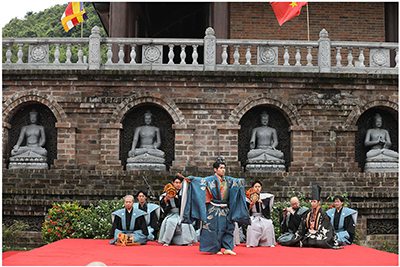 50th anniversary of the establishment of diplomatic relations between Japan and Viet Nam (May 14, Ha Nam, Viet Nam)
50th anniversary of the establishment of diplomatic relations between Japan and Viet Nam (May 14, Ha Nam, Viet Nam)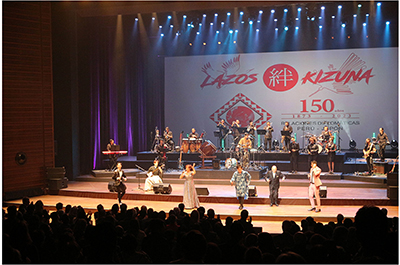 150th anniversary of the establishment of diplomatic relations between Japan and Peru (August 22, Lima, Peru)
150th anniversary of the establishment of diplomatic relations between Japan and Peru (August 22, Lima, Peru)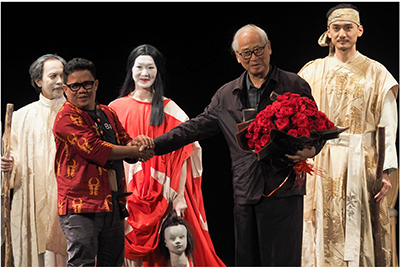 The 50th Year of ASEAN-Japan Friendship and Cooperation and the 65th anniversary of the establishment of diplomatic relations between Japan and Indonesia: Performance of “Dionysus” by the SCOT theatre company (October, Jakarta, Indonesia; Photo: The Japan Foundation ©Djajusman)
The 50th Year of ASEAN-Japan Friendship and Cooperation and the 65th anniversary of the establishment of diplomatic relations between Japan and Indonesia: Performance of “Dionysus” by the SCOT theatre company (October, Jakarta, Indonesia; Photo: The Japan Foundation ©Djajusman)In collaboration with MOFA and diplomatic missions overseas, JF is utilizing its overseas locations to develop arts and cultural exchange projects between Japan and other countries. In 2023, taking advantage of the opportunity provided by the 50th Year of ASEAN-Japan Friendship and Cooperation, JF implemented a variety of cultural exchange projects in Southeast Asian countries, including music concerts and collaborative theatre productions. JF also implements “real” projects (in-person, not online) around the world, such as hosting the Japan Pavilion in the 18th International Architecture Exhibition at the Venice Biennale.
In parallel with these efforts, JF has continued and enhanced the online projects that were launched during the COVID-19 pandemic, such as “STAGE BEYOND BORDERS,” which introduces Japanese performing arts works to the world via streaming videos, and “JFF+,” which introduces various topics related to Japanese cinema and interviews with film industry professionals, as well as streaming films. Through them, JF has been developing projects to promote Japanese culture from multiple perspectives.
Under the “WA Project: Toward Interactive Asia through Fusion and Harmony” announced by Prime Minister Abe in December 2013, for the past ten years JF has been implementing two-way arts and cultural exchange programs and the NIHONGO Partners Program. In order to continue and expand people-to-people exchange programs with ASEAN member states and other regions, the successor to the “WA Project,” the “Partnership to Co-create a Future with the Next Generation: WA Project 2.0,” was announced at the Commemorative Summit for the 50th Year of ASEAN-Japan Friendship and Cooperation in December. Over the next 10 years, JF will intensively implement comprehensive people-to-people exchange programs centered around the next generation of leaders from Japan and ASEAN member states and other regions. JF also presents the “TIFF Lounge,” in cooperation with the Tokyo International Film Festival (TIFF), now in its fourth year. Through this initiative, it provides opportunities for Japanese filmmakers active on the front lines and filmmakers in Asia as well as other countries and regions around the world, to engage in dialogues and exchanges in Tokyo, and as a special program, Director KORE-EDA Hirokazu held a master class for students from China, Southeast Asia (Thailand, Indonesia, the Philippines, Malaysia, and Viet Nam), and Japan.
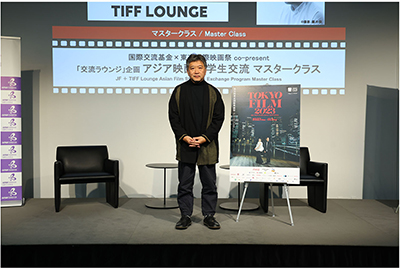 Co-presented by the Japan Foundation and Tokyo International Film Festival, the TIFF Lounge hosted a master class by Director KORE-EDA Hirokazu for the Asian Film Students Exchange Program (October 26, Tokyo; Photo: The Japan Foundation, ©2023 TIFF)
Co-presented by the Japan Foundation and Tokyo International Film Festival, the TIFF Lounge hosted a master class by Director KORE-EDA Hirokazu for the Asian Film Students Exchange Program (October 26, Tokyo; Photo: The Japan Foundation, ©2023 TIFF)The Japan International MANGA Award was launched by MOFA in 2007 to honor overseas manga artists who have created outstanding manga works, with the aim of spreading manga culture overseas and promoting international cultural exchanges through manga. The 17th Japan International MANGA Award, held in 2023, received a record-high 587 entries from 82 countries and regions; the Gold Award was presented to a work from Taiwan, Silver Awards were presented to works from Spain, Viet Nam, and Hong Kong, and the Special Encouragement Award was presented to a work from Saudi Arabia. This year, there were entries for the first time from four countries: Ethiopia, Comoros, Senegal, and Rwanda.
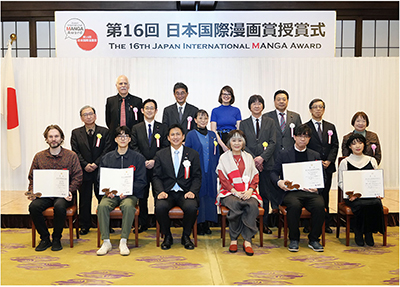 The Award Ceremony of the 16th Japan International MANGA Award (March 2, Tokyo)
The Award Ceremony of the 16th Japan International MANGA Award (March 2, Tokyo)(3) People-to-People Exchange and Exchanges in the Area of Education and Sports
To build personal relationships and promote a better understanding of Japan, MOFA carries out a number of programs that invite foreign nationals who have a significant influence on shaping public opinion and the policymaking process and who are expected to play a leading role in various fields. In the area of education and sports, MOFA conducts various activities to promote a wide range of people-to-people exchanges. These programs not only promote mutual understanding and friendships but also enhance Japan's presence in the international community, which considerably benefits Japan's national diplomatic interests.
A Student Exchange Programs
MOFA actively introduces the attractiveness and opportunities of studying in Japan to foreign students through Japanese diplomatic missions overseas, and implements application and screening procedures to grant the Japanese Government (Ministry of Education, Culture, Sports, Science and Technology) Scholarship to promising students abroad. It also makes efforts to network with former foreign students who have returned to their home countries through Japan Alumni Associations and to expand interest in, understanding of, and support for Japan. In March, the third Japan Alumni Conference was held in a hybrid format following the event held in the previous year, and it was attended by participants from 48 countries. At the Conference, participants gave reports on each alumni association's' domestic activities and exchanged opinions about conferences held in each region, and strengthened networks among alumni from different countries.
The Quad Fellowship was announced at the Second Japan-Australia-India-U.S. (Quad) Summit Meeting in September 2021 as an educational and people-to-people exchange cooperation program, and awards scholarships for studying in the U.S. to outstanding individuals in STEM fields (science, technology, engineering, and mathematics) from the four countries. Under this framework, in August the first 100 fellows (25 from each of the four countries) began their studies in the U.S.
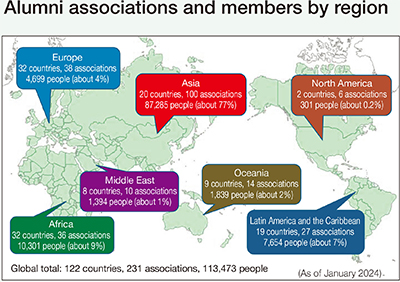
B JET Programme (The Japan Exchange and Teaching Programme)
The JET Programme was launched in 1987 to improve foreign language education in Japan and promote international exchange with Japanese citizens in local areas. This program is administered by local authorities and other organizations in cooperation with the Ministry of Internal Affairs and Communications (MIC), MOFA, the Ministry of Education, Culture, Sports, Science and Technology (MEXT), and the Council of Local Authorities for International Relations (CLAIR). Through the program, young foreign nationals are invited to Japan and appointed to posts in local governments and schools. MOFA is responsible for the application and screening process, pre-departure orientation, and support for the activities of the JET Alumni Association (JETAA), which operates in 19 countries and has about 23,000 members.
In FY 2023, 5,831 participants from 50 countries, including 1,995 new participants, were dispatched to all parts of Japan, and more than about 77,000 people have participated in the JET Programme to date as of July 1, 2023. JETAA conducts activities to introduce Japan in many countries. Many of those who went through the JET Programme are important human and diplomatic assets for Japan, as they go on to engage in activities that contribute to expanding interest in, understanding of, and support for Japan while also playing an active role in a variety of fields in their own countries.
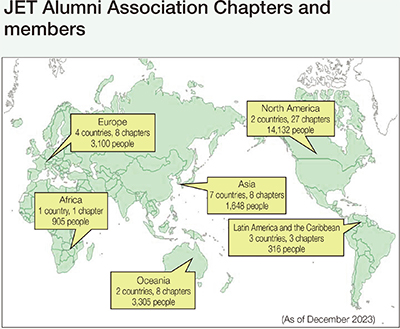
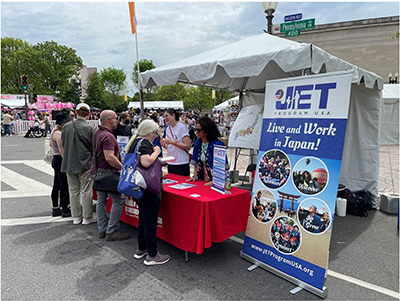 Public relations activities by JET alumni at the Sakura Matsuri – Japanese Street Festival in Washington, D.C. (April 15-16, Washington, D.C., U.S.; Photo: JET Programme Alumni Association)
Public relations activities by JET alumni at the Sakura Matsuri – Japanese Street Festival in Washington, D.C. (April 15-16, Washington, D.C., U.S.; Photo: JET Programme Alumni Association)C Sports Exchange
Sports enable communication beyond language and can be an effective tool for promoting friendly relations and a better understanding of Japan. Under the “Projects for Sports Diplomacy Enhancement” scheme, MOFA is engaged in sports exchange and cooperation initiatives including providing support for the transport of equipment to sports organizations in various countries, thereby contributing to the development of bilateral relations. These projects contribute to enhancing mutual understanding internationally by promoting diplomacy through sports and by expanding interest in, understanding of, and support for Japan. At the same time, they also improve the standing of Japan in the world of international sports.
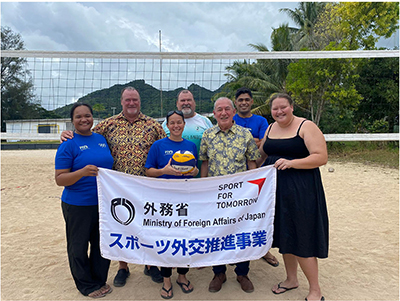 “Projects for Sports Diplomacy Enhancement”: Handover ceremony for a donation of beach volleyballs to the Cook Islands (June 12, Cook Islands)
“Projects for Sports Diplomacy Enhancement”: Handover ceremony for a donation of beach volleyballs to the Cook Islands (June 12, Cook Islands)D Japan's Friendship Ties Programs
With a view to expanding the basis for Japan's diplomacy, which develops bilateral and inter-regional relationships between Japan and countries and regions in the Asia-Pacific, North America, Europe, Latin America and the Caribbean, MOFA implements the Japan's Friendship Ties Programs to promote multifaceted understanding of Japan to youths from various countries and regions, through invitations, dispatches, and online exchanges. In addition, these programs also work to expand interest in, understanding of, and support for Japan, and to strengthen the spread of information about Japan from overseas. In 2023, about 2,000 youths participated in these programs, attending lectures by Japanese experts in politics, economics, society, culture, history, and diplomatic policies, and also went on observation tours in each field and had exchanges of opinions and experienced Japanese culture. These programs kindled interest in Japan amongst young people from various countries and regions; broadened the base of support for Japan; and contributed to promoting understanding of Japan and making Japan's image even more positive in the international community via participants sharing what they learned through the program and their experiences in Japan through reports to their organizations and social media. In addition, about 90 alumni reunions and online Japan revisits were held for alumni of these programs, which increased their motivation to learn about their areas of interest and fostered strong networks by promoting even deeper understanding of Japan, including its relations with other countries and regions.
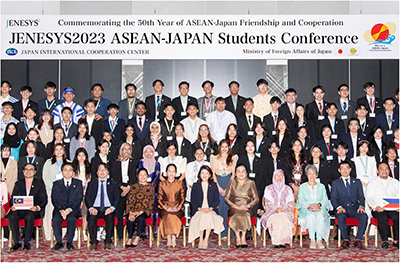 Japan Friendship Ties Programs “JENESYS”: Holding the “ASEAN-Japan Students Conference” to commemorate the 50th Year of ASEAN-Japan Friendship and Cooperation (December 15-18, Tokyo; Photo: Japan International Cooperation Center)
Japan Friendship Ties Programs “JENESYS”: Holding the “ASEAN-Japan Students Conference” to commemorate the 50th Year of ASEAN-Japan Friendship and Cooperation (December 15-18, Tokyo; Photo: Japan International Cooperation Center)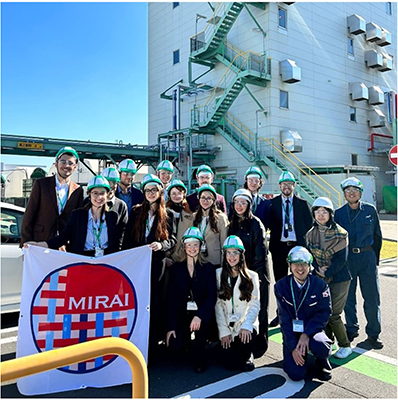 Japan Friendship Ties Programs “MIRAI”: Visit to a biofuel production plant (November 16, Kanagawa Prefecture)
Japan Friendship Ties Programs “MIRAI”: Visit to a biofuel production plant (November 16, Kanagawa Prefecture)(4) Exchange in the Intellectual Field
A Japanese Studies
Through JF, MOFA comprehensively supports a range of overseas research activities related to the politics, economy, society, and culture of Japan. In 2023, JF's Japanese Studies Fellowship Program provided 161 researchers with the opportunity to visit Japan for research. Additionally, with the aim of forming and strengthening networks among researchers both in Japan and abroad, including JF Fellows currently in residence, Japanese Studies Fellow Conferences were held in September at the University of Tokyo and in October at the International Research Center for Japanese Studies in Kyoto.
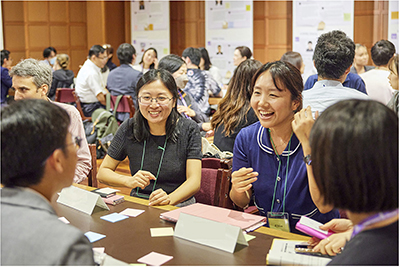 Group discussion by Japanese and international researchers (September, Tokyo; Photo: The Japan Foundation)
Group discussion by Japanese and international researchers (September, Tokyo; Photo: The Japan Foundation)JF also dispensed grants for expanding Japanese studies faculty members, for organizing seminars and symposiums, including online events, and for expanding the collection of books on Japan to a total of 47 institutions of Japanese studies in 25 countries and regions in 2023. In addition, it provided support to academic societies with the goal of promoting network building among Japanese studies researchers and research institutions from various countries and regions.
B International Dialogue
JF also implements Global Partnerships Programs for international dialogues that aim to create and share new knowledge and wisdom, to resolve common issues, and to deepen mutual understanding among future generations. Specifically, it hosted seminars and symposiums based on the themes of common international issues, and conducted literary exchanges by dispatching or inviting authors and other guests. In addition, with a view to deepening interest in and understanding of Japan at the grassroots level in the U.S., it planned, implemented, and supported exchange projects that contribute to promoting dialogue at various levels, human resource development, and the establishment of interpersonal networks. These include the implementation of the Japan Outreach Initiative (JOI) program, a Japan-U.S. grassroots exchange program that dispatches Japanese coordinators to the U.S.
In addition, to commemorate the 50th Year of ASEAN-Japan Friendship and Cooperation, in March, JF held an international symposium entitled “ASEAN-Japan Relations: Entering a New Stage toward a Global Partnership,” where, from the perspective of how ASEAN member states and Japan will work together and cooperate in the future, discussions were held on building new relationships among the next generation of experts. Furthermore, from July to November, JF held the ASEAN-Japan Youth Forum TASC2023, where students from ASEAN and Japan thought together and deepened ties with the aim of co-creating a better world. Additionally, to develop human resources who can contribute to realizing the “Free and Open Indo-Pacific (FOIP)” advocated by the Government of Japan, JF launched a new fellowship program called “the Japan Foundation Indo-Pacific Partnership (JFIPP)” in which experts and practitioners in the region addressed common issues, and in FY2023 a total of 47 individuals participated. Furthermore, with the aim of fostering human resources who can serve as the foundation for future-oriented Japan-China relations, the program invited university and high school students to Japan and conducted online exchange programs.
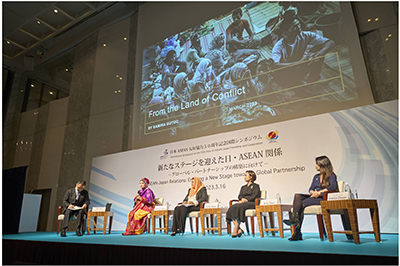 Panel discussion at the international symposium for the 50th Year of ASEAN-Japan Friendship and Cooperation (March, Tokyo; Photo: The Japan Foundation)
Panel discussion at the international symposium for the 50th Year of ASEAN-Japan Friendship and Cooperation (March, Tokyo; Photo: The Japan Foundation)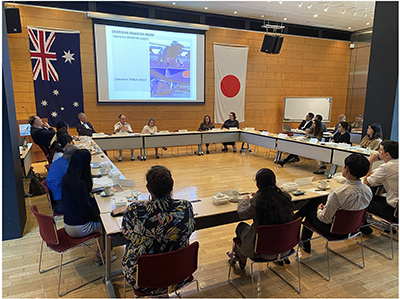 JFIPP Network Followship (Disaster Resilience Group) roundtable at the Australian Embassy in Japan (September, Tokyo; Photo: The Japan Foundation)
JFIPP Network Followship (Disaster Resilience Group) roundtable at the Australian Embassy in Japan (September, Tokyo; Photo: The Japan Foundation)C Japan-United States Conference on Cultural and Educational Interchange (CULCON)
CULCON is a panel where experts from the public and private sectors in Japan and the U.S. engage in discussions on culture, educational exchanges, and intellectual dialogues. At the 30th Plenary Session of CULCON that was held in October, discussions were held on strengthening Japan-U.S. exchanges based on the interim reports of subcommittee meetings on the two themes of (1) information access and sharing in the digital age, and (2) promoting subnational diplomacy and local/regional exchanges. In December, Japan CULCON Chair Sasae submitted to Prime Minister Kishida the Joint Statement by the U.S.-Japan CULCON committee members based on these discussions.
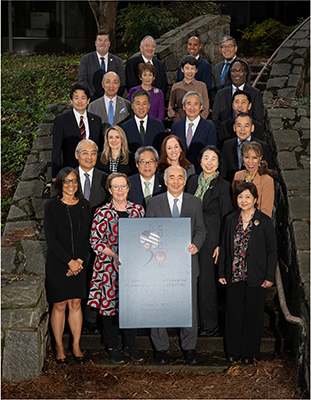 The 30th Plenary Session of the Japan-U.S. Conference on Cultural and Educational Interchange (CULCON) (October 6, Atlanta, U.S.; Photo: The Japan Foundation)
The 30th Plenary Session of the Japan-U.S. Conference on Cultural and Educational Interchange (CULCON) (October 6, Atlanta, U.S.; Photo: The Japan Foundation)D Cooperation with the United Nations University (UNU)
The UNU is the only UN organization headquartered in Japan, and, as a think tank for all UN agencies, the UNU contributes to the international community not only in research on global issues including the Sustainable Development Goals (SDGs) but also in human resource development by offering degree programs, and Japan provides a variety of cooperation and support.
In March, Prof. Tshilidzi Marwala, who served as Vice-Chancellor and Principal of the University of Johannesburg, was appointed as Rector of UNU. Also in March, Rector Marwala paid a courtesy call to Foreign Minister Hayashi and had an exchange of views on strengthening of relations between UNU and Japan, engagement with the “Global South,” and responses to global issues. In November, Rector Marwala also paid a courtesy call to Foreign Minister Kamikawa, where they concurred to further deepen coordination between Japan and the UNU, including in addressing global issues such as the promotion of people-centered international cooperation and the Women, Peace and Security (WPS) in a manner that protects “human dignity.”
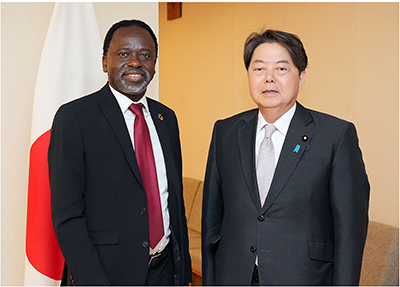 Foreign Minister Hayashi receives a courtesy call from Rector Marwala, the new Rector of the UNU (March 14, Tokyo)
Foreign Minister Hayashi receives a courtesy call from Rector Marwala, the new Rector of the UNU (March 14, Tokyo)In addition, Prof. SHIRAHASE Sawako, UNU Senior Vice-Rector and UN Assistant Secretary-General, is helping to promote discussion on SDGs through the BIG IDEAS dialogue series and other initiatives.
(5) Promotion of the Japanese Language
As the globalization of Japan's economy prompts more Japanese companies to do business overseas and Japanese pop culture finds increasing global popularity, interest in the Japanese language is growing around the world, especially among young people. Further promotion of the Japanese language overseas promotes understanding of Japan overseas and fosters a more favorable international environment for Japanese people and companies, as well as improving the Japanese language proficiency of foreign nationals who wish to work in Japan, thereby contributing to the realization of a society of harmonious coexistence with foreign nationals in Japan. A survey conducted by JF in FY2021 found that approximately 3.79 million people in 141 countries and regions overseas learn Japanese. The number of applicants for the Japanese Language Proficiency Test offered by JF (including those taking the test in Japan) temporarily decreased after 2020 due to the spread of COVID-19, but has since recovered and has been rapidly increasing, with the number of applicants in 2023 reaching a record high of about 1.48 million. Nevertheless, it is clear that a shortage of Japanese language teachers is a major challenge in the pursuit of satisfying the increasingly diverse interests in and needs concerning Japanese language learning in these many countries and regions.
Through JF, MOFA is working to improve the environment for and to address the diverse needs related to Japanese language education overseas. For example, JF dispatches Japanese language specialists abroad; carries out training programs for Japanese language teachers, foreign-service officers and public officials; trains cultural and academic personnel; supports Japanese language education for children; conducts Japanese language pre-training for nurse and care worker candidates under the Economic Partnership Agreement (EPA) with Indonesia and the Philippines; encourages educational institutions in each country and region to introduce Japanese language education and supports Japanese language educational activities; develops teaching materials; runs e-learning programs; and promotes the “JF Standard for Japanese-Language Education,” which corresponds with international standards for foreign language education. Additionally, as part of the WA Project, JF is implementing a program to dispatch NIHONGO Partners to ASEAN member states and others as teaching assistants for Japanese language education in secondary schools and other institutions, and in 2023, 285 people were dispatched to 10 countries and regions.
To address labor force shortages brought about by the declining birthrate and aging population in Japan, Japan has begun to accept foreign nationals under the April 2019 residence status as “Specified Skilled Workers.” Accordingly, through JF, MOFA has been taking new measures since then in accordance with the “Comprehensive Measures for Acceptance and Coexistence of Foreign Nationals” (decided upon at the December 25, 2018, Ministerial Conference on Acceptance and Coexistence of Foreign Nationals), that include conducting the JF Test for Basic Japanese (JFT-Basic), which assesses the Japanese language ability of foreign nationals who come to Japan (by the end of 2023, a total of about 170,000 people have taken the test in 11 countries overseas and within Japan), as well as developing and disseminating learning materials and curriculum with the goal of fostering people's Japanese language ability effectively, and nurturing local Japanese language teachers who teach Japanese to those who wish to work in Japan.
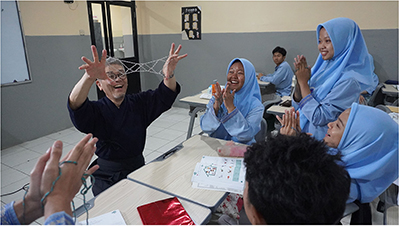 NIHONGO Partners introduces Japanese culture to local students (October, Depok, Indonesia; Photo: The Japan Foundation)
NIHONGO Partners introduces Japanese culture to local students (October, Depok, Indonesia; Photo: The Japan Foundation)(6) Cultural Grant Assistance
To promote culture, sports, and higher education in developing countries, as well as provide support for the improvement of facilities and the purchase of equipment to be used in the conservation of cultural heritage, thereby enhancing mutual understanding and friendly relations between Japan and these countries, the Government of Japan provides Cultural Grant Assistance as part of the Official Development Assistance (ODA). The assistance implemented in 2023 consisted of five Cultural Grant Assistance projects (totaling around 4,467 million Japanese yen) and 15 Grant Assistance for Cultural Grassroots Projects (totaling around 106.45 million Japanese yen).
Specifically, the Government of Japan decided to provide around 4.2 billion Japanese yen in Cultural Grant Assistance for the renovation of a stadium that is popular among Laotian citizens; implemented Cultural Grant Assistance to provide equipment for the exhibiting, restoring, and preserving of cultural assets in museums in Pakistan, Papua New Guinea, Zambia, and Viet Nam; and, as Grant Assistance for Cultural Grassroots Projects, implemented Grant Assistance for Cultural Grassroots Projects centered on cooperation in promoting sports, particularly Japanese martial arts (budo), and Japanese language studies.
(7) Cooperation through United Nations Educational, Scientific and Cultural Organization (UNESCO)
UNESCO is the first international organization that Japan became a member state of after the war, in 1951. Japan is actively involved in a variety of UNESCO projects in the fields of education, science, and culture. Since 1952, Japan has continued to serve as a member of the Executive Board of UNESCO.
Japan also cooperates with UNESCO to provide support to developing countries in areas such as education, science, and culture (See the Column on page 335). In the field of culture, Japan is providing cooperation with the preservation and promotion of the world's tangible and intangible cultural heritage as well as the provision of support in the field of human resource development as its major pillars. It also participates proactively in international frameworks for the protection of cultural heritage. Representative efforts in this area include the provision of support for the restoration and preservation of Angkor monuments in Cambodia since 1994, and the restoration and preservation of the Bamiyan ruins in Afghanistan since 2003. In these projects, Japanese experts played a central role, and human resource development was undertaken to enable local people to protect such sites by themselves in the future. At the same time, Japan has also provided support for the development of conservation and management plans for heritage sites, as well as for their preservation and restoration. In November, Parliamentary Vice-Minister for Foreign Affairs KOMURA Masahiro attended the 4th Intergovernmental Conference for the Safeguarding and Development of Angkor held in Paris, where he outlined Japan's support over the past 30 years and stated that the Government of Japan would continue to provide support utilizing Japan's strengths. At the meeting, the other participants, including Cambodia, expressed their gratitude for Japan's longstanding contributions. In recent years, Japan has also been providing support for human resource development to African countries and small island developing states to help them strike a balance between protecting cultural heritage and sustainable development. As for the safeguarding of intangible cultural heritage, support is provided to projects to pass on traditional performing arts such as music, dance, and traditional arts and crafts to the next generation in developing countries, as well as projects involving development of domestic institutions and capacity building for relevant parties to enhance countries' ability to protect intangible cultural heritage by themselves.
In the field of education, on September 13, 2022, Japan deposited the instrument of acceptance of the Global Convention on the Recognition of Qualifications concerning Higher Education with the UNESCO Director-General. This Convention establishes the principles, criteria, and rights and obligations for recognizing or assessing higher-education qualifications, and provides for, among other things, the sharing of information on higher-education institutions. The entry into force of this Convention (March 5, 2023) is expected to contribute to attracting international students to Japan and encouraging Japanese students to study abroad.
UNESCO Director-General Audrey Azoulay has been promoting “Strategic Transformation” toward strengthening UNESCO, which includes reforms for the de-politicization of UNESCO and organizational reforms, and Japan has been consistently supporting the Director-General in her work. Japan will continue to contribute actively to UNESCO's activities advanced under the leadership of Director-General Azoulay. In January, Prime Minister Kishida received a courtesy call from Director-General Azoulay during his visit to France. Additionally, high-level exchanges of views took place such as a telephone call between Foreign Minister Hayashi and Director-General Azoulay in June and a meeting between Parliamentary Vice-Minister for Foreign Affairs Komura, and Director General Azoulay, during his visit to France in November.
In addition, on July 10, the U.S. returned to UNESCO for the first time in about five years. The return of the U.S. to UNESCO not only symbolizes the further strengthening of its engagement with the international community, but is also extremely significant in revitalizing and enhancing the effectiveness of activities of UNESCO. Japan has made active diplomatic efforts to support the early return of the U.S. to UNESCO. Japan will strengthen its contribution to activities of UNESCO by closely coordinating with like-minded countries, including the U.S.
A World Heritage Convention
The World Heritage Convention aims to protect cultural heritage and natural heritage internationally as heritage belonging to all mankind. Japan became a party to the Convention in 1992 (as of October 2023, the number of parties to the convention is 195). The sites listed on the “World Heritage List” are known as “World Heritage Sites.” They are classified into “Cultural Heritage Sites” (monuments and remains), “Natural Heritage Sites” (natural areas) and “Mixed Heritage Sites” (sites with both cultural and natural elements). As of October 2023, a total of 1,199 World Heritage Sites are inscribed on the World Heritage List, including 25 heritage sites (20 cultural heritage sites and five natural heritage sites) in Japan. The 45th Session of the World Heritage Committee was postponed due to Russia's aggression against Ukraine and was held in Riyadh, the capital of Saudi Arabia, in September 2023.
With regard to the “Sites of Japan's Meiji Industrial Revolution”, the State of Conservation Report was submitted in November 2022 to the UNESCO World Heritage Centre based on the decision adopted by the World Heritage Committee in 2021. Subsequently, a decision based on Japan's efforts was adopted at the 45th Session of the World Heritage Committee in 2023. Japan will steadily implement this decision.
With regard to the “Sado Island Gold Mines” that Japan nominated for inscription as World Heritage, the nomination dossier was submitted once again to the UNESCO World Heritage Centre in January 2023. MOFA will continue to play a steadfast role towards the inscription of the “Sado Island Gold Mines” on the World Heritage List, while explaining about the site to the international community and engaging in in-depth discussions with the relevant countries, so that its extraordinary value as a cultural heritage will be recognized.
B Convention for the Safeguarding of the Intangible Cultural Heritage
The Convention for the Safeguarding of the Intangible Cultural Heritage aims to develop an international system for safeguarding intangible cultural heritage such as traditional performing arts and traditional craftsmanship techniques (as of December 2023, the number of parties to the convention is 182). Japan, with abundant experience in safeguarding domestic intangible cultural properties, served as the chair of the intergovernmental working group reviewing the operational mechanism of this Convention, and led discussions by incorporating requests from developing countries. As of December 2023, a total of 22 elements from Japan are inscribed on the Representative List of the Intangible Cultural Heritage of Humanity, which is created based upon the Convention. In March 2023, a proposal for “Traditional knowledge and skills of sake-making with koji mold in Japan” was submitted to UNESCO to be newly inscribed in 2024.
C UNESCO Memory of the World Programme
The UNESCO Memory of the World Programme was established in 1992 to promote the safeguarding of and access to, and raise awareness of valuable archival heritage. As of December 2023, 494 items have been inscribed under the international register.
The fact that member states could not be involved in the assessment process of the nominations under the previous mechanism, even in the cases where there are clear discrepancies of views between the concerned member states, is not consistent with the founding principle of UNESCO: promoting friendly ties and mutual understanding among member states. After 2017, submission of new nominations was suspended, and Japan led the comprehensive review process of the programme. As a result, a new mechanism was approved by the UNESCO Executive Board in April 2021, under which nominations are submitted through the governments of member states. Additionally, a contestation system was newly established, which keeps nominations over which member states have conflicting views on hold until dialogues between the concerned countries have been concluded. With the completion of the review process, the call for new nominations resumed in July the same year, and in May 2023, new inscriptions of 64 items were decided. From Japan, “The Monk Enchin Archives: A History of Japan-China Cultural Exchange,” nominated by Onjo-ji Temple and Tokyo National Museum, was newly inscribed. Also in November, Japan submitted two applications to UNESCO: for the “Three Editions of Buddhist Sacred Canons from China and Korea Preserved at Zojoji, Japan,” nominated by the Jodo Buddhist sect and Zojoji Temple, and for the “Visual archives of Hiroshima atomic bombing ─ Photographs and films in 1945,” nominated by the Hiroshima City Government, the Chugoku Shimbun, the Asahi Shimbun Company, the Mainichi Newspapers, RCC Broadcasting Co., LTD., and Japan Broadcasting Corporation.
The global COVID-19 pandemic that began in 2020 had a major impact on international cultural exchanges, which had previously taken for granted that people would be able to meet face-to-face. The Japan Foundation (JF), an independent administrative institution responsible for cultural exchanges with other countries, was also forced to significantly review its activities amid restrictions on people's cross-border movement. However, while exploring new forms of exchanges that utilize ICT, JF also continued to take on a variety of initiatives to maintain and develop connections between Japan and the world.
 Video streaming of anime song singer SUZUKI Konomi's Malaysian performance via STAGE BEYOND BORDERS (March, Photo: JF)
Video streaming of anime song singer SUZUKI Konomi's Malaysian performance via STAGE BEYOND BORDERS (March, Photo: JF)For example, the “STAGE BEYOND BORDERS-Selection of Japanese Performances-”1 project, which was launched in 2021 to introduce Japanese stage performances, used YouTube to globally stream a total of 117 subtitled works in a variety of genres, from traditional performing arts to contemporary theatre. As a result of the creative camera work, videos explaining the production process and background knowledge, and other unique online efforts, as of March 2023 the project had been viewed by approximately 18 million people from 137 countries and regions. Numerous people also expressed their gratitude for the project, with comments such as “While I was unable to visit Japan due to COVID-19, this project has become invaluable content for me as a researcher of Japanese dance and theatre.” Now that real face-to-face projects have resumed, JF is also working on new ideas, such as live-streaming performances that are hosted overseas.
In the area of film, the special website “JFF+”2 was launched in 2020 so that people can enjoy Japanese video contents from anywhere in the world. This site, which distributes films and features articles on Japanese films, has become a valuable tool for conveying the appeal of Japanese films to movie fans around the world, including those who are not familiar with Japanese films, and recorded 1.74 million page views in FY2022. Viewer comments on videos introducing mini-theaters around Japan, such as “They're so beautiful! I'd love to go!” suggest that the site is also playing a role in encouraging people to visit Japan. Projects such as online networking events with directors also serve as stepping stones to actual film screenings.
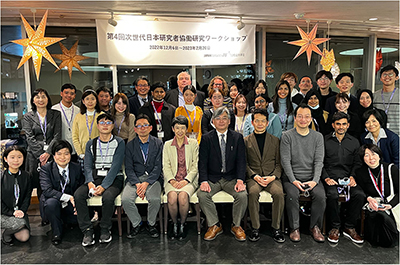 Participants and others involved in the Collaborative Research Workshop for Aspiring Scholars in Japanese Studies (February, Japan; Photo: JF)
Participants and others involved in the Collaborative Research Workshop for Aspiring Scholars in Japanese Studies (February, Japan; Photo: JF)Additionally, the “Collaborative Research Workshop for Aspiring Scholars in Japanese Studies,” which has been held since 2018 for young Asian scholars of Japanese studies, is also utilizing a combination of online and face-to-face meetings. For the fourth installment of the program in 2022, 24 graduate students from 10 countries and regions, including National University of Singapore, the Chinese University of Hong Kong, and Vietnam National University, came to Japan after establishing face-to-face relationships through online lectures and training. After arriving in Japan, they collaborated on group work and panel presentations, with participants commenting, “I had a wonderful time, and was able to connect with scholars and graduate students from different cultural backgrounds.” This experience of diligently working across countries and fields, along with the network that they have cultivated, will be a powerful boost to their future research activities.
As can be seen from these projects, “online” and “real” are not two mutually exclusive choices; rather, by utilizing the strengths of each, ripple effects can be amplified. Now that life has returned to normal, JF is hoping to further develop and evolve these kinds of initiatives that have taken shape through trial and error, and to further expand the horizons of international cultural exchanges.
- 1 For more information about STAGE BEYOND BORDERS-Selection of Japanese Performances-, visit:
https://stagebb.jpf.go.jp/en/
- 2 For more information about JFF+, visit:
https://en.jff.jpf.go.jp/
Traces of the atrocities in Bucha, Ukraine… the numerous buildings and historical sites destroyed by rocket attacks…
When Russia launched its aggression against Ukraine in February 2022, shocking images and information about it were quickly transmitted around the world through television, the internet, and other means. With the rallying cry of “Stand with Ukraine,” many countries and people then stepped forward to support Ukraine in its time of need, a memory that is still fresh in people's minds.
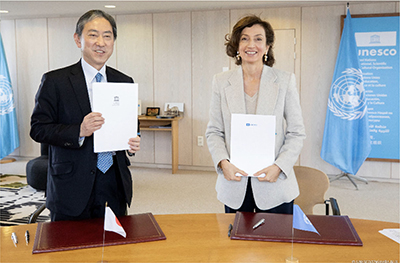 Signing ceremony for the cooperation documents on support for Ukraine (January 31, Paris, France)
Signing ceremony for the cooperation documents on support for Ukraine (January 31, Paris, France)In January 2023, a ceremony was held at UNESCO headquarters for the signing of a cooperation document on Japan's assistance to Ukraine through UNESCO, thereby launching the Government of Japan's own initiative to provide assistance through UNESCO in areas such as culture and education. UNESCO Director-General Audrey Azoulay has repeatedly expressed gratitude for the unprecedented level of support that Japan has provided to Ukraine, posting on X that “I thank Japan for its commitment to UNESCO,” and using her personal X account to mention Japan's support for Ukraine when she visited Ukraine in April. This cooperation, which is primarily support for Ukraine, consists of programs in three areas: (1) Ensuring the safety of journalists working in war-torn areas (journalism); (2) Monitoring, evaluation, protection, restoration, and human resources development for cultural heritage during wartime (culture); and (3) Providing mental health care support for children and students suffering psychological stress due to damage from the war. Some specific examples of this support are introduced below.
The first is “Journalists' Solidarity Centers,” which were established within the framework of journalism support programs. These facilities have been set up in eight locations across Ukraine to enable safe and stable journalistic activities in cities close to combat zones or in cities where the entire town has turned into a battlefield. In addition to functioning as temporary offices, they also provide safety training and lend out protective gear for reporting. The information provided by the local journalists who utilize these facilities is also a valuable source of information for people affected by the war who, mainly for economic reasons, are unable to flee combat zones for safer areas.
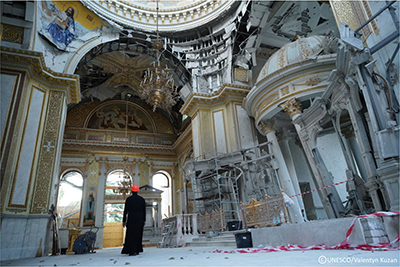 The Transfiguration Cathedral in Odesa, damaged by Russian attacks (Photo: UNESCO)
The Transfiguration Cathedral in Odesa, damaged by Russian attacks (Photo: UNESCO) In a meeting with Ukrainian First Lady Zelenska, UNESCO Director-General Azoulay expressed gratitude for Japan's support (December 13, 2022)
In a meeting with Ukrainian First Lady Zelenska, UNESCO Director-General Azoulay expressed gratitude for Japan's support (December 13, 2022)The second is a cultural assets protection and restoration program that is currently being carried out within the framework of cultural support. As exemplified by a large-scale missile attack in July by Russian forces on the Ukrainian Orthodox Transfiguration Cathedral in the southern city of Odesa, Russia's aggression against Ukraine is also damaging Ukraine's unique culture, history, and religion. Amidst these circumstances, this program provides monitoring, evaluation, protection, and restoration of endangered cultural properties, as well as various technical training programs for the curators and restoration experts who are the key players in restoring cultural properties.
These are just examples of the support being provided, and Japan hopes to continue contributing to the people of Ukraine, who are facing a national crisis, via the kind of attentive and fine-tuned support that only Japan can provide.


